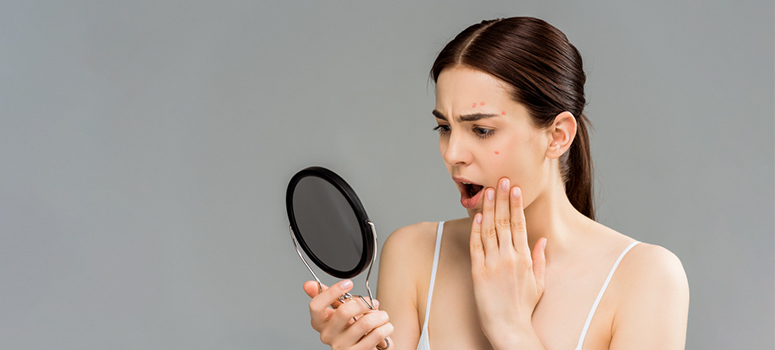It is common to believe that acne only affects people with oily skin. However, dry-skinned individuals can also have breakouts. Acne can affect anyone, regardless of age or skin type. People with oily skin are more likely to develop severe acne issues because they produce more sebum oil than those with dry skin. However, dry skin is susceptible to breakouts because its sebum is thicker and harder to wash off. This can clog pores and cause acne. In addition, some skin care products contain harsh chemicals that dry out the skin and make it more susceptible to breakouts.
Dry skin acne is characterized by whiteheads and blackheads, as well as pimples and pustules. These breakouts often occur on the nose, cheeks, chin, and forehead. They’re usually small and don’t cause much pain or discomfort, but they are unsightly and can take a toll on mental well-being.
Dry skin acne is a common skin condition. But if untreated, it can lead to other serious problems such as infections and scabs. Therefore you should learn about dry-skin acne and take proper treatment so that your skin stays healthy and free of acne outbreaks.
[ NOTE: If you have dry skin and are experiencing acne-like breakouts, treating the underlying issue is important before moving on to traditional acne treatments like antibiotics. This way, you won’t be at risk for developing antibiotic resistance. ]
How to identify dry skin?
Dry skin is characterized by a lack of oil in the skin. It’s usually accompanied by redness, flaking, and itching. Dry skin usually has a tight, stretched feeling and is often associated with a dull appearance. The most common cause of dry skin is heat and humidity. If you live in a hot or humid area, or if you spend time outside during the summer months, this can cause your skin to become dry. Other causes include:
- Overuse of soap or cleansers on your face or body (soap strips the natural oils from your skin)
- Using harsh products like alcohol or acetone on your face or body (these will also strip away essential oils from your skin)
- Using harsh soaps on your face (this can damage the natural barrier function of your skin)
What causes dry skin acne?
Dry skin acne is a condition in which the oil-producing glands in your body are unable to keep up with the amount of sebum produced. Sebum—or natural oils secreted from sweat gland pores—lodges into clogged pores and leads to breakouts.
Dry skin acne is a common condition that affects people of all ages. It’s caused by a combination of factors, including:
- Your skin’s sensitivity to particular products or ingredients, like fragrances and detergents.
- Your skin’s ability to produce oil (sebum). This can be due to genetics or environment.
- The presence of bacteria in your pores. This is the most common cause of dry skin acne, and it can be caused by several factors including excessive use of certain hygiene products and poor hygiene practices.
How to deal with dry skin acne?
If you have acne and dry skin, you may be frustrated by the way it looks. You may also be worried that the acne will get worse if you use products that make your skin even drier.
The good news is that there are many things you can do to keep your skin healthy, even if it’s dry. Here are some tips for treating acne in people with dry skin:
- Keep your face hydrated with a gentle, non-comedogenic moisturiser.
- Use a mild cleanser twice per day to remove oil, sweat, and dirt from your skin.
- Get enough sleep and avoid stressors like smoking, caffeine, and alcohol that can irritate your skin.
- Try an over-the-counter acne treatment containing benzoyl peroxide or salicylic acid to help unclog pores and reduce inflammation.
- Consider prescription medications such as retinoids or antibiotics if these don’t work for you (only after a visit to an expert dermatologist!)
When to see a dermatologist?
Dry skin can be uncomfortable and unsightly, but it’s not usually anything to worry about. When you feel like your dry skin acne is getting out of hand, it’s time to see a doctor. Here are a few concerning symptoms to look out for:
- A pustule (a small red bump on the skin) that lasts longer than a week
- Unusual swelling or inflammation of your skin
- Unexplained pain in any part of your body
Takeaways
Dry skin acne can be a hard thing to deal with, especially when you have an important event coming up or an important meeting at work. You might think that they’re just going to go away on their own, but the truth is that dry skin acne can get worse over time if you don’t take action.
If you have dry or acne-prone skin and are worried about having an embarrassing breakout, reach out to a dermatologist today!














